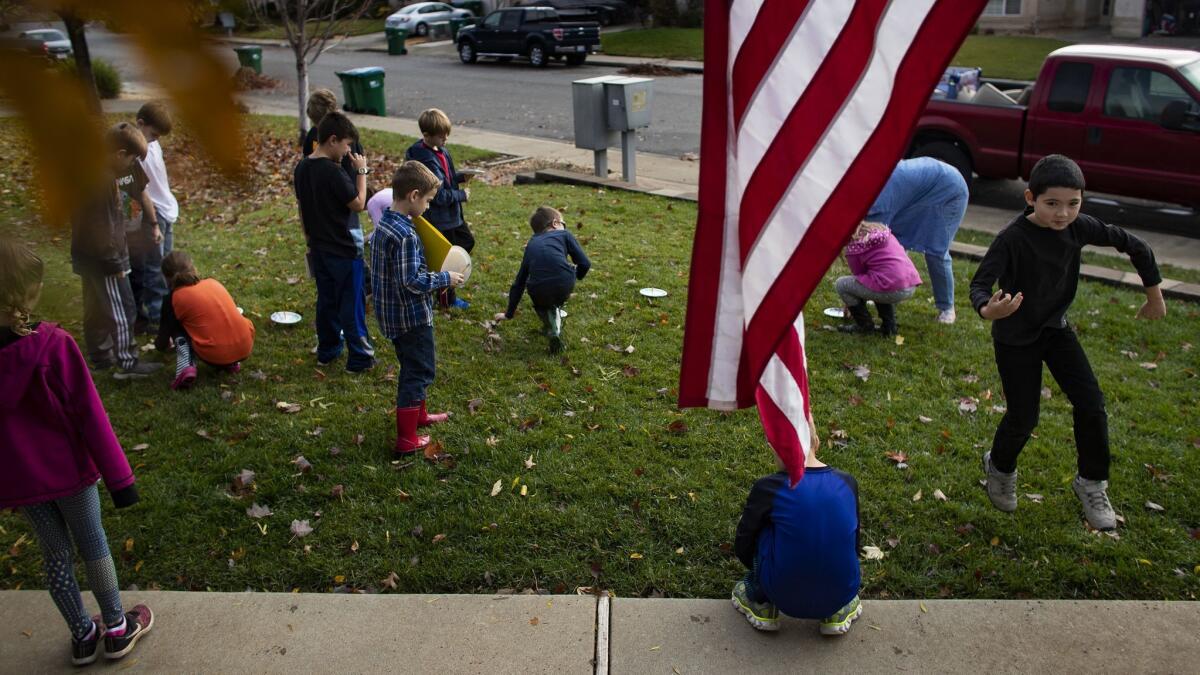Op-Ed: The U.S. is the most powerful country. Why are we so far behind Europe on children’s well-being?

- Share via
The new year is off to a good start for kids and families in California. Gov. Gavin Newsom has hit the ground sprinting, proposing six months of paid parental leave and $1.8 billion in funding for early childhood programs and education.
That’s great news. But any survey of European policies will show that Newsom’s proposal is merely a start.
Though it is the most powerful country in the world, the United States ranks 36th in Save the Children’s latest End of Childhood index measuring the best and worst places to be a child. Eight European countries are in the top 10.
Similarly, in UNICEF’s latest report card on child well-being, the U.S. ranks 37th out of 41. Nine of the top 10 countries are in Europe.
The U.S. simply isn’t keeping pace with the rest of the developed world when it comes to giving children the best possible chance to succeed.
On a recent trip across Europe, I identified three key reasons why countries there are safer and more nurturing for children.
First, there is a healthy respect for children’s rights underlying all policies concerning children. Second, there are government structures in place to ensure that children’s rights are upheld. Finally, there is a safety net of basic universal benefits to support children and their families.
The United Nations Convention on the Rights of the Child, passed in 1989, sets standards for education, healthcare, social services and other policies that affect children. Although officials from the Reagan and George H.W. Bush administrations helped write the child rights treaty, the U.S. is the only U.N. member state that hasn’t ratified it. Opponents cite the administrative burden of complying with the convention, as well as concerns that it could interfere with the parent-child relationship.
In Europe, by contrast, the convention is regarded not as a burden, but rather a helpful framework for keeping the needs of children front and center in all policy matters. Some countries have gone well beyond the convention’s basic requirements. Finland, for instance, has established a State Youth Council, responsible for assessing the impact of any new legislation on children.
Across Europe, there is a host of government structures designed to uphold children’s rights and serve kids. The European Network of Ombudspersons for Children brings together institutions from 35 member countries with this goal.
France’s ombudsperson, Genevieve Avenard, is a longtime defender of children’s rights and current chair of the European network. Her position was created by constitutional amendment, and her office studies specific issues and releases annual reports and recommendations. It also serves as a court of last resort for complaints about child services.
Ireland has gone a step further and created not only an ombudsperson for children, but a separate minister for children’s affairs.
A number of countries involve children in the legislative process. Britain has the U.K. Youth Parliament, to which 300 kids are elected. Twice a year, the youth parliament invites every British child between the ages of 11 and 18 to give feedback on issues they find important. The five leading topics then get debated, and a report is sent to the adult Parliament.
When it comes to universal benefits for children and families, Europe is significantly ahead of the U.S.
Enter the Fray: First takes on the news of the minute »
In Sweden, parents are entitled to a total of 16 months of paid leave, to be divided as they choose. In Germany, every child between the ages of 1 and 3 has the legal right to early childhood support in a day-care center. And in the Netherlands, after a baby is born, a kraamverzorgster, or home maternity nurse, comes to the family’s house for eight to 10 days following the birth and spends three to eight hours a day helping the new parents.
The U.S. simply isn’t keeping pace with the rest of the developed world when it comes to giving children the best possible chance to succeed. But the whole of Europe offers promising models from which the U.S. can learn and adapt, and the Newsom administration is now setting an example for other American states to follow.
As the 116th Congress begins to legislate in Washington, let’s remember that, no matter what divides us politically, we can all agree to care for our kids.
Dr. David Alexander, a practicing pediatrician and advocate for children for more than three decades, is the founding president of Leading for Kids. He previously served as president and CEO of the Lucile Packard Foundation for Children’s Health.
Follow the Opinion section on Twitter @latimesopinion or Facebook
More to Read
A cure for the common opinion
Get thought-provoking perspectives with our weekly newsletter.
You may occasionally receive promotional content from the Los Angeles Times.









